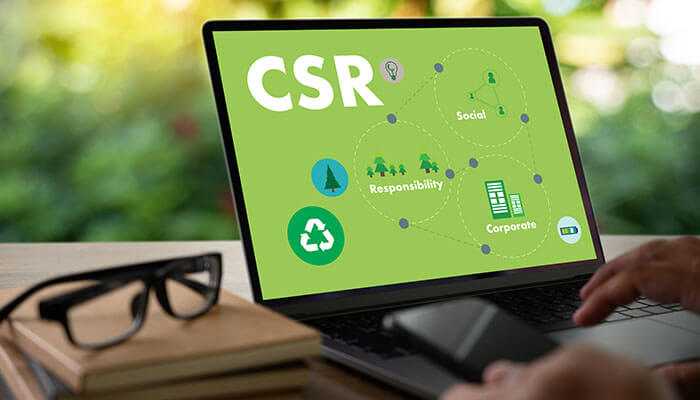Corporate Social Responsibility (CSR) has become a cornerstone for businesses striving to balance profitability with ethical practices. CSR encompasses a wide range of activities, from ethical labor practices to environmental stewardship. One critical aspect of CSR is the management of waste disposal. How a company handles its waste not only affects the environment but also reflects its commitment to social and economic responsibilities.
Effective waste disposal practices can significantly enhance a company’s CSR profile, demonstrating its dedication to sustainability and community well-being. Conversely, poor waste management can lead to environmental degradation, health risks, and legal troubles, damaging a company’s reputation and stakeholder trust. As businesses increasingly recognize the importance of CSR, understanding the impact of waste disposal becomes essential.
Understanding CSR in the Context of Waste Management
Definition and Principles of CSR:
Corporate Social Responsibility refers to a business model in which companies integrate social and environmental concerns into their operations and interactions with stakeholders. The core principles of CSR include ethical business practices, environmental stewardship, and contributing to community well-being.
The Role of Waste Management in CSR Initiatives:
Waste management is a crucial component of CSR as it directly impacts the environment and society. Effective commercial waste disposal practices align with CSR principles by reducing environmental harm, promoting sustainability, and enhancing the quality of life for communities. Companies that prioritize responsible waste management demonstrate a commitment to reducing their ecological footprint and fostering a sustainable future.
Environmental Impact of Waste Disposal
Pollution and Its Consequences:
Improper waste disposal can lead to significant pollution, contaminating air, water, and soil. This pollution can harm wildlife, disrupt ecosystems, and pose health risks to humans. For example, plastic waste in oceans leads to marine life ingestion and entanglement, affecting biodiversity and marine ecosystems.
Resource Depletion and Ecosystem Damage:
Wasteful practices contribute to the depletion of natural resources. Over Reliance on landfills consumes land space and can lead to the destruction of habitats. Additionally, the extraction of raw materials for single-use products depletes natural resources, causing long-term environmental damage.
Climate Change Contributions:
Waste disposal, especially in landfills, generates greenhouse gases such as methane, a potent contributor to climate change. Effective waste management practices, such as recycling and composting, can significantly reduce these emissions and help combat global warming.
Social Impact of Waste Disposal
Public Health Concerns:
Improper waste disposal can lead to public health issues. For instance, unregulated dumping and inadequate waste treatment can contaminate water supplies and create breeding grounds for disease-carrying pests. These health risks disproportionately affect vulnerable communities, exacerbating social inequalities.
Community Relations and Trust:
How a company manages its waste can impact its relationship with the community. Transparent and responsible waste practices build trust and demonstrate a company’s commitment to the well-being of its neighbors. On the other hand, negligent waste disposal can lead to community opposition and damage the company’s reputation.
Employee Well-being and Morale:
Employees take pride in working for companies that prioritize ethical practices and sustainability. Implementing robust waste management systems can boost employee morale, increase job satisfaction, and foster a sense of shared purpose within the organization.
Economic Impact of Waste Disposal
Cost Implications for Businesses:
Inefficient waste management can lead to higher operational costs, including waste disposal fees, regulatory fines, and potential legal costs. Conversely, adopting efficient waste management practices can result in significant cost savings through reduced disposal fees and resource conservation.
Regulatory Fines and Compliance Costs:
Non-compliance with waste management regulations can result in substantial fines and legal penalties. Ensuring compliance through proper waste disposal practices helps businesses avoid these costs and maintain a good standing with regulatory bodies.
Opportunities for Cost Savings and Revenue Generation:
Implementing recycling programs and waste-to-energy initiatives can turn waste into a valuable resource. Businesses can generate revenue from selling recyclable materials and save on energy costs through waste-to-energy conversion. Additionally, adopting circular economy principles can create new business opportunities and drive innovation.
CSR Strategies for Effective Waste Management
Implementing Comprehensive Waste Management Plans:
Developing and executing a detailed waste management plan is essential. This plan should include waste audits, segregation strategies, and clear guidelines for disposal and recycling. Regularly reviewing and updating the plan ensures continuous improvement.
Fostering a Culture of Sustainability within the Organization:
Encouraging a culture of sustainability involves educating and engaging employees at all levels. Providing training on waste reduction practices and promoting environmentally friendly behaviors can help embed sustainability into the company’s core values.
Partnering with Sustainable Suppliers and Service Providers:
Collaborating with suppliers and service providers who prioritize sustainability can enhance overall waste management efforts. Choosing partners with robust environmental practices ensures that waste is managed responsibly throughout the supply chain.
Benefits of Integrating Waste Disposal into CSR
Enhanced Brand Reputation:
Companies known for their commitment to responsible waste management and sustainability often enjoy a positive brand image. This reputation can attract environmentally conscious customers, investors, and employees.
Increased Customer Loyalty and Investor Confidence:
Demonstrating a commitment to CSR can build customer loyalty and attract investors who prioritize ethical and sustainable practices. Consumers are increasingly making purchasing decisions based on a company’s environmental and social impact.
Long-term Sustainability and Competitive Advantage:
Integrating waste management into CSR strategies helps ensure long-term business sustainability. By reducing waste and conserving resources, companies can lower operational costs and gain a competitive edge in a market that increasingly values sustainability.
Conclusion
Waste disposal is a critical component of Corporate Social Responsibility, impacting a company’s environmental, social, and economic responsibilities. By prioritizing effective waste management practices, businesses can enhance their CSR initiatives, reduce their ecological footprint, and build stronger relationships with stakeholders.
Implementing comprehensive waste management plans, fostering a culture of sustainability, and partnering with sustainable suppliers are essential strategies for integrating waste disposal into CSR. The benefits are clear: enhanced brand reputation, increased customer loyalty, investor confidence, and long-term sustainability.
Take action today to review and improve your waste management practices. Integrate waste disposal into your CSR strategy and contribute to a more sustainable and responsible future for your business and the planet.




